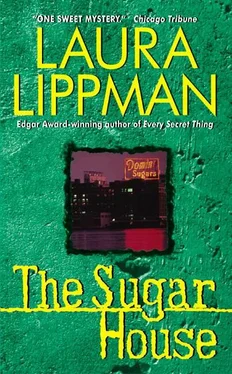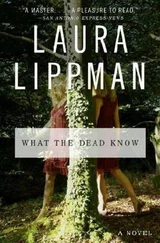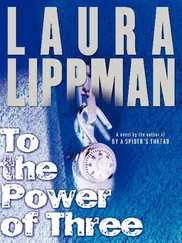“Can you come see me as soon as you’re done? I really need your help, Starsky.”
Whitney needed a half beat. “I thought I got to be Hutch.”
“You can be whoever you like. It turns out I do need a partner. But not just any partner. A Valley girl with connections and time on her hands. Someone who would make a very credible, very desirable volunteer for Senator Dahlgren’s fledgling congressional campaign. You know anyone like that?”
“Why I just might,” Whitney drawled. “I might know someone who fits that description to a T.”
TESS WAITED IN HER CAR OUTSIDE DAHLGREN’S DISTRICT office, a plain storefront in a part of South Baltimore that didn’t even pretend to be fashionable. A few yuppies had tried homesteading here, but the rowhouses in this block still leaned heavily toward Formstone and painted screens. The businesses were mundane as well. No chic or funky restaurants, just a shoe repair and a corner liquor store, which was enjoying a pre-Christmas run on Big Game lottery tickets.
Tess was on a side street that afforded an unobstructed view of the district office’s front door. Unfortunately, she had to move her car every two hours. Because of Federal Hill’s night-time attractions and the proximity of both Camden Yards and Ravens PSINet Stadium, South Baltimore was death on parking. Being in one’s car was no protection against the overzealous meter maids who patrolled the area. Twice already, Tess had been forced to drive around the block and find a new spot, just to stay within the law. Surveillance was a cruel mistress; it brooked no lapses. For all she knew, she had lost Adam Moss in one of those quick swings around the block.
Campaign finance laws had made watching Adam Moss more complicated than Tess had realized when she made that first call to Whitney. He worked for the senator, not the unofficial congressional campaign, and the two had to be kept as separate as possible. So while Whitney was in another storefront in an Anne Arundel County strip center, stuffing envelopes and enduring paper cuts, Tess was following Adam Moss through his average day. It was so average as to be mind numbing: Baltimore to Annapolis to Baltimore and back again. All he did was work, as far as she could tell, but she continued to follow him. He was the only lead she had.
He lived in a small rowhouse on Grindall Street, within walking distance of the district office. Most mornings, he stopped there about 7:30 A.M., then left for Annapolis after grabbing coffee at the 7-Eleven on Light. Tess would have thought Adam Moss was a Starbucks kind of guy, or at least a Sam’s Bagels kind of guy. Normally, she would have liked someone better for being a 7-Eleven coffee-and-cruller man, but since Moss might be an accessory to a murder her goodwill toward him was tempered.
Once in Annapolis, Moss was largely inaccessible, closeted in the inner rooms of the senator’s office. Dahlgren had ridden the hobby horse of the ethics probe as far as it could go. Senator Hertel was history-he had finally and abruptly agreed to resign just before the vote for explusion, which meant the Democratic Central Committee was hand-picking his replacement. Dahlgren had no official role to play in this process, but his opinion was suddenly valued, and would-be kingmakers came and went, eager for an audience with the rising star. Tess tried to linger in the halls of the senate office building, but strangers were too conspicuous with the General Assembly out of session, and the security guards kept asking what she wanted.
But if she stationed herself outside, Adam Moss could bypass her by using the subterranean passages that linked the buildings in the State House compound. So she ended up spending a lot of time on Lawyers Mall, waiting for him to pop out of any number of doors. She felt as if she were engaged in a large-scale version of the boardwalk game Whak-a-Mole. Whak-a-Moss, actually, and how she longed to. She wanted to grab him by the lapels and demand to know how he had come to have that phone list, and who else might have seen it.
But she couldn’t. If Adam Moss realized she was following him, it would get back to Arnie Vasso and, before too long, her father would get another call. Perhaps just a courtesy call this time, an acknowledgment that since he had failed to keep his nosy daughter at bay, Gene Fulton was going to be history, and so was he.
So she waited and watched, grateful for the boring, predictable routine that was her subject’s life. Adam Moss was all business. If he went out for lunch, it was always takeout-sushi from Joss Café or the Marvin Mandel sandwich from Chick ’n’ Ruth’s deli. If the senator had a committee meeting, Moss was there by his side, the first to arrive and the last to leave. The senator cut out early, headed for his campaign office or various fund-raisers, but Adam Moss stayed long after the December sun set. He sometimes cruised through a Burger King drive-in on West Street on his way out of Annapolis, or grabbed dinner-to-go from Matsuri, the sushi restaurant back in his own neighborhood. Adam Moss had a taste for raw things. Then he disappeared into his house and didn’t come out until the next morning. Tess knew, because she had spent one cramped and cold night on his block.
Today, he had left Annapolis at three, but he had been here, sequestered in the district office, since arriving in Baltimore. A man and woman had been waiting for him. Constituents, small business owners, judging by their simple, neat clothes, and cheap briefcases. They probably needed a law tweaked in the next session.
Her cell phone rang.
“I’m bored, Tesser.”
“Welcome to detective work, Whitney. I hope you’re not calling me from headquarters.”
“I’m on a pay phone, outside a Royal Farm. I volunteered to make a soda run. You know, we probably shouldn’t be talking on a cell phone. It’s not a secure line. It can be picked up by shortwave radio.”
“Whitney, you called me .”
“Oh, yeah.”
“Have you found out anything?”
“Only that the money is pouring in. Dahlgren himself came in and dialed for dollars for a few hours this afternoon, then took off for some Christmas party. He asked me if I wanted to come with him.”
“The happily married senator asked the young blond volunteer to go to a Christmas party with him? That’s interesting.”
“Actually, it’s not. Dahlgren’s only passion is money, far as I can tell. He thought I could help shake some loose just by standing there, eating hors d’ oeuvres. You know how some men mentally undress you with their eyes? Dahlgren makes me feel as if he’s assessing my jewelry. It’s my mother he really wants. Not very likely, given his voting record on AIDS programs. Give Mother her due-she still believes it’s respectable to be a liberal Democrat.”
Tess was only half listening. The lights in the office had gone out, the couple had left, and now Adam Moss was locking the door behind him.
“Gotta go,” she told Whitney. “Work hard, and maybe you’ll be promoted to answering phones before the week is out.”
She followed Adam Moss’s car up Light Street. Do cars give any insight into character? Adam Moss, who looked as if he should be behind the wheel of a sports car, drove a Geo, the American-made cousin to Tess’s Toyota. The navy blue car was clean, outside and in-Tess had crept up to its windows the night she waited outside his house. There was nothing inside, not even a road map. The radio was a good one, the high-end kind with a detachable face. He had a Club, but almost everyone in South Baltimore did.
He took her past the harbor, onto President Street and the JFX beyond that. He turned off at the Falls Road exit, heading into the heart of Hampden, a working-class neighborhood enjoying a burst of popularity in the city’s suddenly, inexplicably hot real estate market. Here, yuppies and rednecks coexisted peacefully. Most of the time.
Читать дальше












